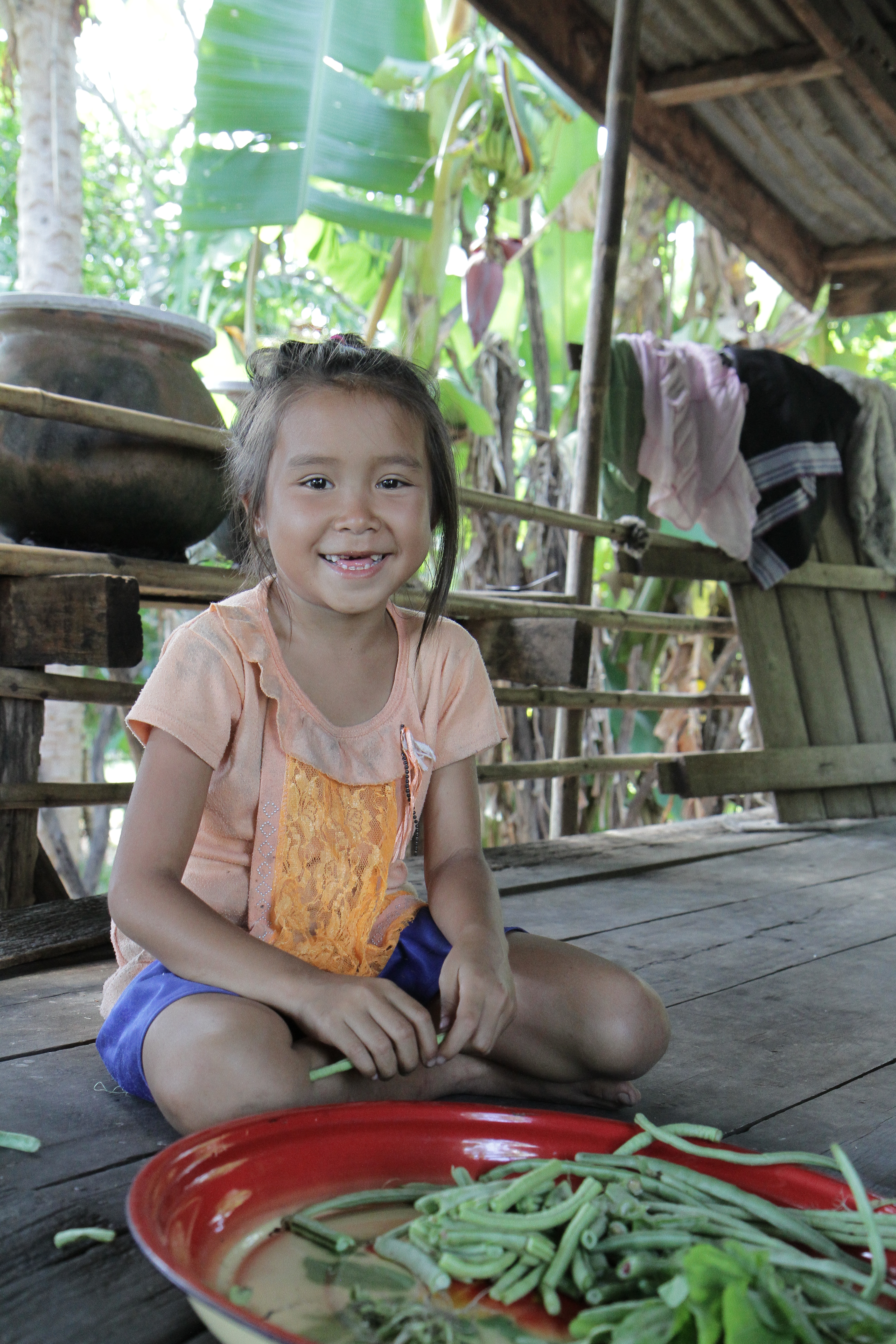The scent of yellow papayas
Sin is a shy girl from Vang Khornekham village. For the eight-year-old, having a family garden means she can grow up healthily.
Her parents have participated in numerous World Vision projects, learning the importance of proper nutrition for their children.
“She’s lucky to grow up at a time when World Vision is in our village. Most of her older siblings didn’t have the same quality of life as she has now.”
Sin’s parents used to be subsistence farmers, depending on their rice field, wild vegetables and the sale of non-timber products to survive.
Her father, Pern, says, “I worked hard, but still didn’t make enough money for my family.”
His wife adds, “I didn’t think about what my children ate as long as their stomachs were full.”
In 2010, World Vision’s development project in Xonnabouly introduced new farming techniques to the village, selecting Sin’s father to demonstrate them to others. Pern learned how to prepare land for new rice seeds, fruit trees and vegetables, as well as making bio-fertiliser from compost.
“After the training, I realised that the traditional farming practices we’d used for generations had to change. We used to burn the rice fields after a harvest, but not any more.”
Pern wasted no time after the training to pass on what he had learned from World Vision’s food security project, producing the bio-fertiliser shortly afterwards.
“It’s not hard,” he says. “We already have everything we need to make it. It’s just a matter of knowing how to use it.”
The farmer has been using the eco-friendly fertiliser since 2013, his rice yields doubling as a result. “Now I can sell rice at the market and make financial plans for my family,” he says. “There’s been a very big difference in our village since World Vision arrived.”
Vang adds: “Today, we can earn 6.9 million kip [850 US dollars] a year.”
The amount is enough to keep the couple’s four children in school and start saving.
A few steps from the family’s wooden home is a new garden started thanks to the project. Papaya trees stand tall over the luscious patch growing under the hot sun.
Pern says, “We want to make sure we have enough food to feed our family, especially our children, so we’ve planted banana and papaya trees, long beans, chillies and many kinds of vegetables.”
His wife adds, “I’ve also started making more food for my children and encouraging my youngest ones to eat more vegetables.”
“These new vegetables could make the difference between a healthy or stunted child. When families grow vegetables and regularly include them in children’s meals, the necessary intake of micronutrients such as calcium, iron and vitamins A and C is reached."
“With more nutrients, children can develop and grow into healthy adults. Without proper nutrition, children are more vulnerable to diseases and face risks to their development.”
According to figures gathered in 2011 and 2012, stunted growth and underweight development continue to affect one in every three children below the age of five in Laos. In mountainous, rural areas, the situation is worse.
Sin’s mother, who attended World Vision’s village-based training in early childhood care and development, says: “I learned the importance of nutritious food for our children. I realised that the food I was preparing for my children lacked certain nutrients that are vital for their well-being and development.”
Vimala continues, “Child health is closely linked to family income levels. When families don’t have a lot of money, they are often unable to provide a wide variety of food for their children.”
Today, Sin and her siblings are healthier than ever, their mother saying, “I’m proud to see them growing up healthily and doing well in school.”
Meanwhile, Sin says, “When I grow up, I want to help people learn, just like my parents did with people in my community.”
Since 2010, World Vision has worked in 18 villages in Xonnabouly, focusing on improving maternal and child health, education, food security and child protection in the district and supporting 2,160 children through its sponsorship programme.
